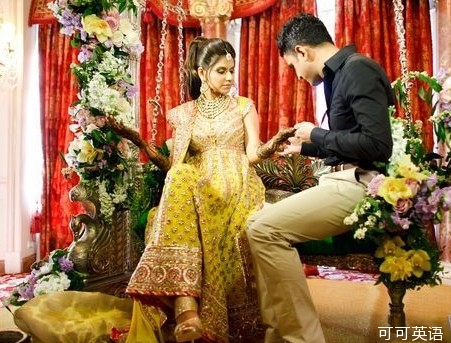(单词翻译:单击)

In the world’s second-most populous country, most of the money, attention and design that goes into clothing are focused on a single event in a woman’s life: a huge, opulent wedding. Even the subcontinent’s most cutting-edge ready-to-wear designers fund those lesser activities with sales from their couture bridal collections. Indeed, bridal wear accounts for 80 per cent of India’s fashion industry.
在全球第二人口大国印度,花在服饰上的大多数钱、精力以及各种款式都聚焦在女人一生中的一件大事身上——场面奢华的婚礼。甚至全印度最杰出的成衣设计师,也都愿意用销售定制婚纱系列的收入去赞助这些稍逊于时装秀的婚事。实际上,新娘装的销售额占到了印度整个时装业收入的80%之多。
So it’s no surprise that Mumbai’s glitterati were in full attendance at the showing of the Swarovski-studded collection put on by Tarun Tahiliani at last year’s India Bridal Fashion Week. Tahiliani is a noted Indian designer, both of ready-to-wear and bridal fashion, infusing some western elements into his richly coloured gowns and taking advantage of a growing $20bn-a-year industry.
因此,印度孟买(Mumbai)的上层人士云集去年的新娘婚装周(India Bridal Fashion Week),专程欣赏塔伦??塔希里安尼(Tarun Tahiliani)设计的施华洛世奇(Swarovski)水晶镶嵌婚纱裙系列,也就不足为奇了。无论在成衣还是婚装,塔希里安尼都是印度出类拔萃的设计师,他把西方设计元素融入各种色彩艳丽的印度长袍中,并从印度蒸蒸日上的时装产业(每年200亿美元的规模)中大获其利。
Other Indian designers, such as Sabyasachi Mukherjee and Rohit Bal, also do big business in bridal wear. “The big weddings will last four, five, six days,” says Bandana Tewari, fashion features editor at Vogue India. “And while for the most radical westernised couples you might have a segment where you can wear something foreign – even, say, Comme des Gar??ons – the main day will always be extremely traditional. You’d never wear western clothes.”
包括慕克吉(Sabyasachi Mukherjee)与罗希特??巴尔(Rohit Bal)在内的其他印度设计师也在婚装生意中挣了个盆满钵满。“大型婚宴往往持续四天、五天、甚至六天,”印度版《Vogue》时尚编辑班丹纳??蒂瓦里(Bandana Tewari)说。“尽管对于西化程度很高的夫妇来说,婚礼期间可能偶尔会穿一次外国款式服装——甚至穿Comme des Gar??ons——但大婚那天,就一定得穿正宗印度传统服饰,永远不可能穿西式服装。”
At Tahiliani’s show, male and female models hit the catwalk in blood-reds, deep maroons and golds weighed down with crystals. There were traditional sari-like gowns as well as more European silhouettes, inspired largely by the regimes that preceded the English Raj, especially the Mughal dynasty. “It was a time of great art, literature, dance and philosophy, no different from the Renaissance era in the west,” says Tewari.
在塔希里安尼时装发布会上,T型台上男女模特穿的都是坠挂水晶的血红色、深栗色以及金黄色的服装。发布会既展出了浓郁欧式风格的服装,也不乏印度传统的纱丽长袍,它们的设计灵感主要来自大英帝国统治(English Raj)前的各个朝代、尤以莫卧尔王朝(Mughal dynasty)为甚。“当时印度的艺术、文学、舞蹈以及哲学空前繁荣,完全可与西方的文艺复兴时代(Renaissance)相媲美,”蒂瓦里说。
As Tahiliani says, “bridal is the one time that Indians dress up”. “The pageantry of the past, the customs, the traditions, the song and dance – all go into making a wedding the most celebrated moment in an Indian’s life. It’s also recession-proof. Mothers start saving for a wedding almost when a child is born.”
塔希里安尼说,“印度人参加婚礼时,都会穿得衣冠楚楚”。“历史、习俗、传统以及歌舞交相辉映、眼花缭乱——所有这一切让婚礼成了印度人一生中最重要的瞬间;这也是家庭经济状况开始走下坡路的铁证:差不多孩子刚出生,母亲们就开始为婚礼节衣缩食。”
They had better. Tahiliani’s pieces start at $4,500 and rise quickly to $60,000. And a good Indian wedding will include different outfits for different days.
他们最好得马上开始积攒,塔希里安尼设计的服装刚推出时的价格只有4500美元,如今已经快速飚升至6万美元。而且印度的大排场婚礼讲究在几天时间里穿不同的服饰。
The boom in bridal wear isn’t just powered by tradition. As in China, the other emerging market powering the world’s luxury industry, India is bursting with new millionaires eager to spend. “People in western countries have lots of ways to spend money. In India, we don’t. But for a wedding, all of our family and friends get together,” says Vijay Singh, chairman of India Bridal Fashion Week. “It’s a time to showcase your wealth.”
婚装的火爆行情并非仅由传统所推动。与中国(支撑奢侈品行业的新兴市场)一样,印度不断涌现的新贵也具有强烈的消费欲望。“西方国家消费者的花钱模式多种多样,但印度并非如此。但举办婚礼时,所有的亲朋好友都会济济一堂,”印度新娘时装周主席维杰??辛格(Vijay Singh)说。“这是展示自己家底殷实与否的好机会。”
Singh says the bridal fashion industry is growing at 20-25 per cent a year, with destination weddings becoming quite the rage. In the past two years, locations such as Bali, Florence, Istanbul and Monaco have hosted the nuptials of some of India’s rich cosmopolitan families.
辛格说,随着度假婚礼越来越风靡,婚装业正以每年20%-25%的增长速度发展。过去两年里,巴厘岛、佛罗伦萨、伊斯坦布尔以及摩纳哥等国家(地区)成了印度一些富有的四海为家的家庭举办婚礼的首选地。
“Indians love bling,” says Tewari. “A wedding here is all about unapologetic energy, colour, shine and embellishment. People are not going to scale down just because the western world has decided drag-down chic is cool. No Indian bride will compromise on the Indianness of her bridal dress.”
“印度人喜欢奢华的排场,”蒂瓦里说。“他们办起婚礼来,就是一意孤行地忙活,穿着华丽、光彩照人、奢华之极。印度人并非因为西方人觉得穿拖地裙酷就愿意降低婚礼标准。印度新娘都希望穿着传统婚纱参加婚礼,没有一个新娘子愿意为此随便凑合。”


